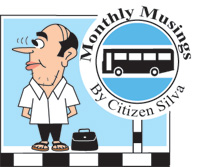Sunday Times 2
Poems from my schooldays
View(s):I am looking forward, in a couple of months, to celebrating my eightieth birthday.
Although I am often reminded of the fact that I am getting older by the regular aches in my joints, the need to carefully hold the banister when going up and down the stairs and the occasional lapses of my memory (remembering faces and names is becoming particularly difficult these days!) I am grateful that I have had the opportunity of witnessing the many changes that have taken place in our country during the past eight decades.
I have lived through independence in 1948 and the creation of a republic in 1972. As a young schoolboy, I was around to celebrate when Duncan White won this country’s first Olympic medal (for 400 metre hurdles) in 1948 — and as a young man when M.J.M. Lafir became Sri Lanka’s first world champion when he won the world billiards championships in 1973. I have witnessed the horror of 1958 as well as the insurgency of 1971 — and have I have survived the dark days of the Tiger Wars. I have celebrated vociferously when Sri Lanka defeated Australia to win the Cricket World Cup in Lahore in 1996 and, just last week, I was able to savour with pride our Test team’s victory and Kusal Perera’s epic innings in South Africa.
Life has been good to me and, as I look back, I cannot but agree with that famous traveller Ibn Batuta, the Moor from Tangier, who visited Sri Lanka in the 14th century and observed that this was the most beautiful island on earth, being “only forty leagues from Paradise”.
Ours certainly is a beautiful island, God’s own country, where every prospect should be pleasing. We are blessed with a healthy tropical climate, we occupy an enviable geographical position at the hub of the ancient Maritime Silk Road and we have been attracting travellers and traders from far-away lands for centuries.
And as I reflect upon the situation in our country these days I recall these lines from Lord Macauley’s poem Horatius that we learned as schoolboys:
 ‘Then none was for a party
‘Then none was for a party
Then all were for the state
Then the great man helped the poor
And the poor man loved the great
Then lands were fairly portioned
Then spoils were fairly sold
The Romans were like brothers
In the Brave days of Old’
As I look around me today, I cannot help musing that we in Sri Lanka today have lost our sense of values — the values of those ancient Romans that prevailed in the ‘brave days of Old’.
Our leaders in modern Sri Lanka appear to care more for their party (actually for themselves, because they change parties whenever they feel it opportune to cross over) than they do for the state and the nation. Great and powerful politicians are wont to help those less fortunate than themselves only if they see an advantage or publicity for themselves. We as citizens can no longer be confident that our lands and the profits of public enterprises are fairly distributed, since we have become so used to politicians distributing crown lands to their catchers and appointing siblings, siblings-in-law and sundry torch bearers to the boards of public corporations.
Politicians in power appear to be more concerned with helping their supporters import goods without paying customs duty and looking after rich well-wishers who pay their penthouse rents. Parliament is used, not to alleviate the problems of the people, but to trade cheap insults, to throw chilli powder at members of the opposing team and to ponder the possibility of doing urine tests on parliamentarians to detect who is using illicit drugs like cocaine. Corruption, political rivalries and internal party conflicts consume our politicians’ attention and drain resources that could be devoted to economic advancement.
From Macauley’s Horatius my musings took me to another quotation — this one from Reginald Heber, one time Bishop of Calcutta:
What tho’ the spicy breezes blow soft o’er Ceylon’s isle;
Though every prospect pleases, and only man is vile?
We live in an island with great resources and potential, a land where every prospect pleases – one which with careful and principled management could achieve such great prosperity. Sadly, however, the vile men whom we elect to office in this nation of ours seem more concerned with myopically looking after themselves rather than the nation.

